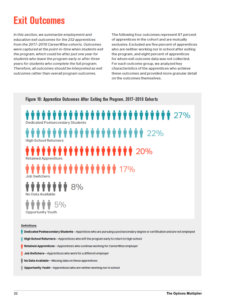By Mandana Nakhai, Senior Manager, Research
CareerWise is thrilled to announce the release of a new white paper authored by Harvard’s Project on Workforce: The Options Multiplier: Decoding the CareerWise Youth Apprentice Journey. The research explores key drivers of apprentice retention and completion for CareerWise Colorado’s first two cohorts, which started their earning and learning journeys in 2017 and 2018. It also examines applicant outcomes from Colorado’s 2019 apprentice hiring cycles.
The Project on Workforce’s research sheds light on questions central to the refinement, growth and, ultimately, scale of CareerWise’s youth apprenticeship model: what levers can intermediaries pull to encourage youth to persist in apprenticeship, and to complete? How can we ensure that socioeconomic status, race, and ethnicity are not predictive of entrance into apprenticeship, retention or completion? Are some occupations more conducive to apprentice success than others?
 In addition to exploring factors that drive equitable outcomes, the research paints a nuanced picture of the range of outcomes themselves. The Project on Workforce team found evidence of the “options multiplier” effect CareerWise has long hypothesized as being unique to youth apprenticeship relative to other training models. As a previous Project on Workforce report argued, most approaches in the innovative and growing “education-and-employment sector” still reinforce the college or career dichotomy and prioritize outcomes traditionally associated only with a single path. Despite an increasing recognition that the college-for-all narrative excludes significant young talent from paths to economic mobility and contribution, there are few approaches that meaningfully span and integrate both education and work. Youth apprenticeship, in its embrace of the potential for education and work to meaningfully enhance one another as learning modalities and pathways into careers, opens doors to multiple overlapping possibilities. The new report found that 64% of CareerWise apprentices in the studied cohorts transitioned to postsecondary education, employment or both. Only 5% were neither in school nor in the workforce after exiting the program.
In addition to exploring factors that drive equitable outcomes, the research paints a nuanced picture of the range of outcomes themselves. The Project on Workforce team found evidence of the “options multiplier” effect CareerWise has long hypothesized as being unique to youth apprenticeship relative to other training models. As a previous Project on Workforce report argued, most approaches in the innovative and growing “education-and-employment sector” still reinforce the college or career dichotomy and prioritize outcomes traditionally associated only with a single path. Despite an increasing recognition that the college-for-all narrative excludes significant young talent from paths to economic mobility and contribution, there are few approaches that meaningfully span and integrate both education and work. Youth apprenticeship, in its embrace of the potential for education and work to meaningfully enhance one another as learning modalities and pathways into careers, opens doors to multiple overlapping possibilities. The new report found that 64% of CareerWise apprentices in the studied cohorts transitioned to postsecondary education, employment or both. Only 5% were neither in school nor in the workforce after exiting the program.
The report also represents an exciting milestone in CareerWise’s evidence building journey – our first opportunity to examine the entire apprenticeship lifecycle by connecting multiple datasets, including administrative data, satisfaction surveys, and results of bi-annual apprentice competency evaluation by supervisors. Building evidence both about how youth apprenticeship changes lives and “what works” to maximize those positive impacts is an incremental process. The Project on Workforce’s findings will directly inform our in-progress national learning agenda for 2023, as we seek to build on what we have learned about the circumstances in which apprentices encounter setbacks and succeed in the program. Our aim is to continue to describe the outcomes we see, and for whom, and to generate more knowledge about why and how those outcomes may have occurred.
With gratitude to the Harvard Project on Workforce for guiding the field of implementers, policymakers and business leaders dedicated to ensuring the next generation of learners can take multiple paths to economic mobility – we look forward to your thoughts, reactions and feedback on the white paper.